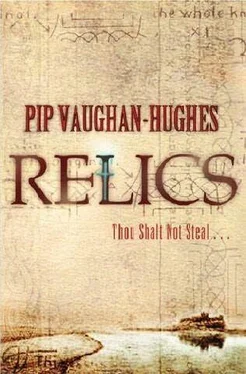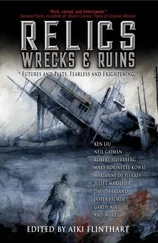Pip Vaughan-Hughes - Relics
Здесь есть возможность читать онлайн «Pip Vaughan-Hughes - Relics» весь текст электронной книги совершенно бесплатно (целиком полную версию без сокращений). В некоторых случаях можно слушать аудио, скачать через торрент в формате fb2 и присутствует краткое содержание. Жанр: Исторический детектив, на английском языке. Описание произведения, (предисловие) а так же отзывы посетителей доступны на портале библиотеки ЛибКат.
- Название:Relics
- Автор:
- Жанр:
- Год:неизвестен
- ISBN:нет данных
- Рейтинг книги:4 / 5. Голосов: 1
-
Избранное:Добавить в избранное
- Отзывы:
-
Ваша оценка:
- 80
- 1
- 2
- 3
- 4
- 5
Relics: краткое содержание, описание и аннотация
Предлагаем к чтению аннотацию, описание, краткое содержание или предисловие (зависит от того, что написал сам автор книги «Relics»). Если вы не нашли необходимую информацию о книге — напишите в комментариях, мы постараемся отыскать её.
Relics — читать онлайн бесплатно полную книгу (весь текст) целиком
Ниже представлен текст книги, разбитый по страницам. Система сохранения места последней прочитанной страницы, позволяет с удобством читать онлайн бесплатно книгу «Relics», без необходимости каждый раз заново искать на чём Вы остановились. Поставьте закладку, и сможете в любой момент перейти на страницу, на которой закончили чтение.
Интервал:
Закладка:
Thus we had passed the great Bay of Naples and the great smouldering peak of Vesuvius, of which I had read in Pliny, and then down past the flames of Stromboli and the smoke of Etna – I remember these sights more than any other, as they were the strangest and filled me with wondering dread. We passed Stromboli at night, and Anna's lips found mine for a moment as we stood at the rail and watched the flames from the mountaintop cast ghastly pink and orange shadows on the black cloud that lowered overhead.
Then, as we passed the Straits of Messina and left Italy at Cape Spartivento, setting off into the Ionian Sea – I loved to hear these names, and pestered Nizam all I could to learn them – I felt a change in Anna. She was quivering like a courser about to be slipped free, and grew silent, although she seemed to seek my presence more. But most days she spent in her station at the bows, wedged in the angle between the rail and the bowsprit, watching the dolphins and flying fish that kept us company and gazing endlessly at the blue distance which hid Greece. She had taken her place there early on the morning we reached the island, as soon as land showed itself as the merest sliver on the horizon. Now her hair was stiff with salt spray, and her eyes were distant and slightly fevered.
'Do you hear it?' she asked. 'The land is singing to us. That is the song of my home.'
We were making for a gap in the lower cliffs that seemed to ring the island. Smaller breaks in the rock gave onto little beaches, each with a grove of trees clinging to whatever level ground there was. But Nizam had pointed the Cormaran at a stone gateway, where the cliffs dipped down into tapering spits and finally broke, letting the sea flow in towards the base of the greater mountain. At the end of each arm of rock stood two small stone turrets from the top of which spun four triangles of pure white cloth. They were windmills, childlike compared to the creaking giants of home but strangely festive amid all this water and arid rock.
We passed close enough to the starboard spit to hear the swish of the mills and to see the rock drop sheer into the deeps, white stone gleaming through the air-clear water. Thick red weed grew there, with fat sea anemones and clusters of black, spiky orbs.
'Echinoos,' said Pavlos, licking his lips. "You would say "urchins".'
I told him we had no such barbaric creatures in Devon, and that I wasn't going to have them anywhere near my mouth. 'No, no: you are the barbarian here, Patch,' Anna reminded me. You will eat echinoos, I insist. They are sublime. They taste like… you'll see.' I huffed. But in truth I was strangely drawn to this place already. We had made only one other landfall in the Mediterranean Sea, at Pisa, a place of man's artistry and artifice, and the filth that always accompanies man had turned the water a sickly, opaque grey. We had skirted the arid coasts at a distance, close enough to smell the herb-laced breeze but too distant to make out details. Now it was close enough to touch, and I felt a sudden shiver of excitement. Then we were past the point, and the Bay of Limonohori opened before us.
It was a gigantic cove, a giant's stone basin tipped towards the sea, the lip just submerged, the walls rising on all sides until they fused with the mountain that towered high over everything. Straight ahead, a white village on a strip of white beach shimmered through the heat. Suddenly we were out of the wind and the air was still and hot and filled with the shrieks and rasps of unnumbered legions of insects. I smelled pine resin and thyme, and herbs that I could not name; stone dust, and a faint, pungent stink that was not unpleasant. The place was soaked in scent and noise and dry heat, as if the bay were an alchemist's alembic and we had intruded on some miraculous operation.
As we moved on, I could see houses on either side of us, small whitewashed cubes with roofs of red pan tile standing out from the dark grey-green trees. On the beaches, men sat mending nets while their brightly painted boats skipped at anchor in the clear, silver-blue shallows. I waved – something not done aboard the Cormaran, but I could not help myself – and a few waved back. At my side the Greeks were visibly shaking with joy. They whispered back and forth, their hands drawing urgent signs in the air between them. 'Have you been here before?' I asked them.
'I have,' said Pavlos. His face fell for a moment. 'They were not so pleased to see me then. It was when I sailed with… when I was with the pirates. I think we raided every village on these islands, but we didn't see the people. They would hide in the mountains, and besides, they had nothing to steal. But Venice is strong now, and the pirates are all dead or fat and old. Or respectable-' and he dug Panayoti in the ribs. 'They don't seem to be afraid of us at all.'
'Because we bring trade, not ruin. In any case, this time our brand of piracy will be more – what shall I say? – delicate.'
'He means that we aren't going to land, collar the first old man we see and tell him we've come to pinch their Saint Tula.' It was Gilles. 'The Captain is very, very good at his work.'
The truth, of course, was that we were here to steal these people's most precious possession. Tula's body was the beating heart of Limonohori and of Koskino itself. Although I did not believe that – nor did any of us -1 had not forgotten that I had once been one of the faithful, the credulous. I missed it, that feeling of certainty. When you lose faith you never quite fill the emptiness left behind. And so I was not yet so estranged from my past to wave away the import of what we had come here to do.
But then I thought, as the cypresses and those strangely gnarled, grey-leaved trees slipped by, if no one knows that Tula has gone, has she really left? It is faith that has the true power, not the object, and provided we left their faith intact, maybe we would have done no great wrong. I spat over the side. Well, I had solved that problem, I thought, bitterly.
I am a little ashamed to report that these dark thoughts slipped away as soon as I heard the rattle and hiss of the anchor cable and felt the Cormaran stall beneath my feet. We were perhaps four rods' length from shore, but the cable paid out twenty fathoms before the anchor struck. It was deep below us, and the sun's rays, very low now, made darts of speckled gold that dived and vanished. The village was there before us, a scatter of houses and a strange little church, with a merry chaos of painted boats at anchor in the shallows and drawn up onto the glaring white pebbles. A crowd was gathering at the edge of the water. They certainly were not afraid of the Cormaran, I thought, as I watched men wade out to their boats and begin to row out to us. They rowed standing up and facing forward, pushing their whole bodies into the task, sunburned men with curly black hair and beards, wearing simple tunics as white as the stones of the beach.
Pavlos, with Elia and Panayoti at his heels, was clambering into the gig. Anna made to follow, but Gilles held her back gently. 'Not yet, Vassileia,' he murmured. We will do this properly, with a little style.' Meanwhile the three Greeks were rowing madly towards the villagers. They met in open water, and the villager in the lead boat grabbed the gunwales of the gig and pulled it alongside him. I saw Pavlos put out his hand and felt a certain relief when it was taken warmly. There was much hand waving in the Greek style, and then the flotilla pulled towards us again.
'So they trust us for now,' said the Captain behind us. 'That is good.' The village headman had ordered a feast in our honour, and despite the short notice, pigs and goats were already sizzling on their spits by the time Anna and I waded ashore. Trestles had been set up in the square beneath two great trees whose bark was smooth and peeling, showing the creamy skin of the trunk beneath.
Читать дальшеИнтервал:
Закладка:
Похожие книги на «Relics»
Представляем Вашему вниманию похожие книги на «Relics» списком для выбора. Мы отобрали схожую по названию и смыслу литературу в надежде предоставить читателям больше вариантов отыскать новые, интересные, ещё непрочитанные произведения.
Обсуждение, отзывы о книге «Relics» и просто собственные мнения читателей. Оставьте ваши комментарии, напишите, что Вы думаете о произведении, его смысле или главных героях. Укажите что конкретно понравилось, а что нет, и почему Вы так считаете.












